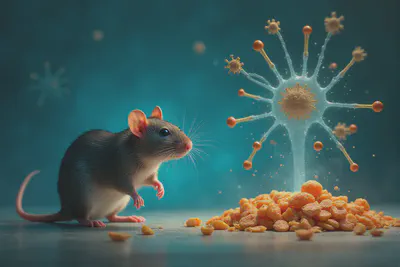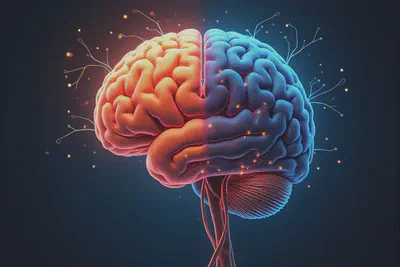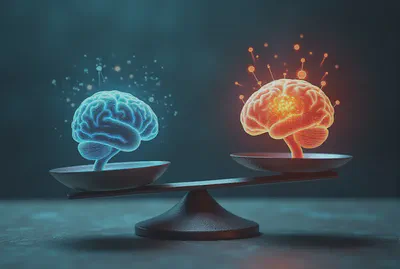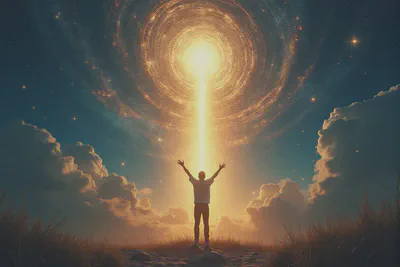The Power of Dopamine: Insights of Anna Lembke and Spiritual Perspectives
 Images of this article generated with AI
Images of this article generated with AIUnveiling the Power of Dopamine with Anna Lembke and Exploring Divine Perspectives on Human Purpose and Eternal Life
In an era where digital distractions, addictive substances, and compulsive behaviors dominate our lives, understanding the brain’s chemistry is more crucial than ever. At the forefront of this understanding stands Dr. Anna Lembke, a renowned psychiatrist, Stanford professor, and one of the leading experts on dopamine and addiction. Her profound insights, shared in her interview with Steven Bartlett on his podcast Diary of a CEO, shed light on how this single chemical influences our thoughts, actions, and well-being.

This article aims to distill the core messages from Dr. Lembke’s enlightening conversation, emphasizing the importance of understanding dopamine’s role in addiction and how we can harness this knowledge to live healthier, more balanced lives. Additionally, I will explore a potentially transformative perspective: could our dopamine system be a divine design - intentionally crafted to guide us toward eternal life, spiritual fulfillment, and meaningful connection?
The Fundamental Role of Dopamine in Survival and Pleasure

Consider a classic scientific experiment: scientists engineer rats with no dopamine in their brains. When food is placed directly in their mouths, they eat, but if the food is just a body length away, they starve. This startling result reveals dopamine’s essential role, not just in pleasure but in motivation and survival. It’s the brain’s way of signaling what we should approach, investigate, and pursue.
Dr. Anna Lembke explains that dopamine is a chemical messenger produced in our brains that helps us experience reward, pleasure, and motivation. Interestingly, dopamine is often more about the drive to seek out something than about the pleasure itself. Without it, basic survival becomes nearly impossible, as the rat experiment demonstrates.
The Dual Nature of Pleasure and Pain in the Brain

One of the most groundbreaking discoveries in neuroscience over the past 75 years is that the same brain regions process both pleasure and pain. Our brains seek to maintain a delicate balance, a state called homeostasis. When we pursue pleasurable activities, our brain adjusts by downregulating dopamine transmission, leading to tolerance, which necessitates more of the same stimulus to achieve the same effect. This neuroadaptive process can spiral into addiction.
Dr. Lembke shares her personal experience of becoming addicted to romance novels, illustrating how even seemingly harmless behaviors can hijack our neurochemistry. Her journey of restoring balance involved deliberately reducing her engagement with these stories, which ultimately improved her mental health and daily functioning.
The Mechanics of Dopamine: How Activities Impact Our Brain

Everyday activities -eating, sugar, social media, work, sex- affect dopamine levels. Engaging in pleasurable behaviors releases dopamine, signaling importance for our survival. However, artificial stimuli, such as online platforms and drugs, can flood the reward system with overwhelming dopamine release, confusing the brain and leading to addictive patterns.
Dr. Lembke emphasizes that dopamine release varies among individuals; what is highly reinforcing for one person might be less so for another - a concept called “drug of choice.” For some, alcohol or drugs produce intense dopamine surges, while others might find social media or gambling more stimulating.
She explains that the brain’s reward system is designed to be activated gradually through effort - think of hunting for food or building a shelter. Modern technology, however, offers instant gratification -swiping, clicking, scrolling- bypassing this “evolutionary” process and creating a mismatch that predisposes us to addiction.
The Balance of Pleasure and Pain: Neuroadaptive Responses

When we indulge in pleasurable activities, our brain responds by releasing dopamine, creating feelings of reward. But it also initiates a counter-response: reducing dopamine receptors or transmission to restore balance. This neuroadaptation results in tolerance - requiring more of the stimulus to achieve the same effect.
Dr. Lembke uses the analogy of a scale: pouring whiskey into the pleasure side causes an imbalance. The brain compensates by tilting toward pain, which leads to withdrawal symptoms like craving, irritability, and insomnia once the effect wears off. This overshoot is nature’s way of maintaining equilibrium but can also trap us in cycles of addiction.
At this point, discussing the hangover that usually emerges after alcohol consumption gets out of control, Steve asked: Why does it overshoot? Why can’t it just perfectly hit homeostasis?
Dr. Lembke’s answer hit me hard, but not for the reasons you would think of right away:
Because then we’d feel fine. Why did Mother Nature do that to us? So cruel! I’m going to tell you an evolutionary story. We don’t really know why this mechanism exists (this made me think in an other direction apart from evolution theory), but from an evolutionary perspective, if you’re living in a world of scarcity and ever-present danger, this is the perfect mechanism to ensure that we’re never satisfied with what we have and that we’re always wanting more. It’s made us the ultimate seekers. Immediately after getting something, we feel a lack of pleasure and are at a deficit on the pain side of the scale, which means we’re going to seek out more dopamine. In a world where everything is quite scarce, that could mean going on another four-hour hunt the next day to kill a gazelle. Stevens realisation: So that’s going to motivate me. But people that have hangovers don’t seem very motivated, right? Dr. Lembke’s answer: Right! So why is that? It’s because alcohol is a product of human engineering that releases so much dopamine all at once in the reward pathway that our brains are reeling to compensate. We weren’t evolved (or maybe designed) for this much pleasure that’s so easily accessible, as you said. We evolved (or have been designed) to do a lot of work upfront and to be hungry and lonely and tired and then get a little reward that would bring us back to the level position. Does that make sense?
This makes a lot of sense to me for reasons beyond human physiology alone, but I will revisit this point later.
Addiction as a Disruption of Homeostasis
Repeated exposure to addictive substances or behaviors shifts the baseline of our pleasure-pain balance, often tilting it toward pain. The “Gremlins” on the pain side of the scale -representing neuroadaptations like downregulated dopamine receptors- necessitate increasing amounts or potency of substances just to feel normal.
In this state, abstinence leads to withdrawal symptoms: anxiety, depression, insomnia, and craving. Over time, the brain’s reward system becomes less responsive, making it harder to experience pleasure from natural rewards.
The Vicious Cycle: Stress, Relapse, and Overcoming Addiction
Stress acts as a trigger for relapse. Experiments with rodents show that after addiction, exposure to stress or extreme pain drives them to seek out their drug of choice again - highlighting how stress and trauma hijack the reward system. The everyday stressors encapsulated by the acronym HALT (Hungry, Angry, Lonely, Tired) can precipitate cravings.
Dr. Lembke emphasizes that recovery involves not just abstinence but also managing stress and building resilience. Practices like exercise, fasting, and engaging in challenging physical activities can increase dopamine naturally, helping to restore balance without the pitfalls of synthetic stimuli.
Empathy and Understanding Addiction
A crucial message from Dr. Lembke’s work is fostering empathy for those struggling with addiction. Recognizing that addicts are driven by neurobiological processes beyond their immediate control can reshape societal attitudes. Addiction often stems from an attempt to self-medicate pain - whether physical, emotional, or psychological.
She highlights that addiction can affect anyone, regardless of background. Children as young as five or six can experiment with substances, and digital media platforms are now engineered to be addictive - further complicating the landscape.
Practical Strategies for Rebalancing Dopamine
Dr. Lembke offers actionable advice:
- Dopamine Fasting: Temporarily abstaining from stimulating activities to reset the reward system.
- Movement and Exercise: Regular physical activity elevates dopamine levels sustainably and reduces reliance on artificial stimuli.
- Mindfulness and Presence: Practicing being in the moment diminishes the need for external rewards and reduces anxiety.
- Managing Stress: Recognizing triggers like HALT and developing coping mechanisms.
- Professional Help: Severe addiction requires medical and psychological intervention, especially with substances like alcohol or benzodiazepines, which can cause life - threatening withdrawal.
Moving Toward a Balanced, Fulfilled Life
A key insight from Dr. Lembke is that modern society’s obsession with instant gratification has led us away from appreciating the process - the effort and patience that naturally produce dopamine. She advocates for embracing discomfort, engaging in meaningful activities, and cultivating resilience.
Living in a way that aligns with our “evolutionary” wiring involves balancing pursuit and patience, embracing challenges, and avoiding overexposure to artificial stimuli. Recognizing the transient nature of pleasure and pain, and accepting discomfort as part of life, can foster a more sustainable and joyful existence.
This is the point at which I believe I have uncovered a deep spiritual dimension. If our neurobiology was not evolved by chance but was intentionally designed with a purpose, could it reflect a divine blueprint - one that guides us not only to survive but also to seek eternal life, spiritual connection, and a variety of meaningful purposes?
A Divine Blueprint? The Neurobiology of Seeking as a Reflection of Divine Intent

As an avid Bible student and self-motivated researcher into the truths of creation, evolution, and science altogether, with the goal of nurturing a holistic, balanced view, I have come to see compelling evidence supporting the creation perspective - one where human beings were intentionally crafted with purpose. The realization struck me sharply when I heard Dr. Lembke speak of the dopamine system as making us “the ultimate seekers” mentioning that she would tell the evolutionary story, as if she were leaving room for other considerations. It resonated deeply: what if our neurobiological wiring is not accidental but a deliberate divine design? This could completely rewrite our understanding of the true purpose of this mechanism.
Could it be that our innate drive to seek, driven by dopamine, is an intentional feature woven into our very biology - created to meet both our physical needs and our spiritual longings? From this perspective, the pursuit of connection, purpose, and even eternity -longings embedded in our very nature- may very well be signs of a higher purpose.
Linking Science to Spiritual Goals
Humans’ deep desire for immortality, legacy, and connection with God may be rooted in this neurobiological drive. Our relentless pursuit of more -that is, more meaning, more connection, more life- may be an echo of a divine plan to lead us toward eternal life, not only in our “souls” but also literally in our life and ongoing search for divine purpose for eternal life on earth.
The dopamine system, in this realisation, acts as a divine “program”, encouraging us to seek the things of God, to transcend limitations, and to live in harmony with our true nature, originally designed for eternity. The frustrations of modern over-stimulation and superficial pleasures can be seen as a disconnection from our original divine purpose - an invitation to realign with our higher purpose.
A Divine Perspective on Human Longing
This divine purpose is echoed in Ecclesiastes 3:10,11, which states: “I have seen the occupation that God has given to the sons of men to keep them occupied. He has made everything beautiful in its time. He has even put eternity in their heart; yet mankind will never find out the work that the true God has made from start to finish.
This verse beautifully captures the idea that God has woven a sense of eternity into the very fabric of our being, inspiring us to seek and long for something greater - a divine connection, purpose, and eternal life - even if the full understanding of God’s plan remains beyond our grasp. It reminds us that our quest for meaning and eternal life is not accidental but part of a divine design, urging us to trust in the divine timing and purpose behind our innate drives.
Practical Implications
Recognizing that our neurobiology is part of a divine design can inspire us to pursue meaningful, purpose-driven lives - cultivating connections with God, others, and our environment. It suggests that our drives for growth, connection, and even eternal life are not mere accidents but intentional features meant to lead us toward spiritual fulfillment.
Moving Toward a Balanced, Spiritually Aligned Life

Understanding that our seeking behaviors are embedded within both biological and spiritual frameworks can foster a more integrated approach - balancing effort with patience, embracing challenges, and cultivating resilience. Practices that elevate dopamine naturally -such as service, spiritual disciplines, and community- can help realign us with our divine purpose.
Living in harmony with this divine blueprint involves embracing discomfort, engaging in meaningful pursuits, and trusting that the innate drive to seek is ultimately directed toward eternal life and a harmonious relationship with God.
Final Thoughts
Dr. Anna Lembke’s conversation with Steven Bartlett illuminates the profound influence dopamine has on our lives. Her insights challenge us to understand the neurobiological roots of addiction and to adopt strategies that restore balance. By doing so, we can break free from cycles of compulsive behavior, cultivate resilience, and find genuine fulfillment.
Her work reminds us that we are not powerless; with awareness, discipline, and compassion, we can rewire our brains toward health and happiness.
As she eloquently states, “The brain wants to maintain balance. When we press on the pleasure side, the brain compensates by tilting toward pain. Understanding this process is the first step to mastering our own neurochemistry.
Her insights into dopamine and addiction open a window not only into our neurobiology but also into our divine origins. Her work challenges us to see our biological drives as part of a higher design - an intentional blueprint guiding us toward eternal life, divine connection, and fulfillment.
By understanding this divine dimension, we can approach our pursuit of happiness and purpose with a renewed sense of hope and responsibility. Our neurobiology, far from being accidental, may be a testament to a Creator’s loving and purposeful design - crafted to draw us ever closer to the divine and to the promise of eternal life.
Revelation 21:3,4: With that I heard a loud voice from the throne say: “Look! The tent of God is with mankind, and he will reside with them, and they will be his people. And God himself will be with them. And he will wipe out every tear from their eyes, and death will be no more, neither will mourning nor outcry nor pain (obviously not in the absolute, literal sense) be anymore. The former things have passed away.
Spiritual Aspect Summary:
- Our dopamine system, as described by Dr. Lembke, reflects an innate drive to seek - potentially a divine feature guiding us toward eternity.
- The relentless human pursuit of meaning, connection, and transcendence aligns with this purpose, indicating that our neurobiological wiring may serve a higher, divine plan.
- Embracing this perspective can transform our understanding of addiction, motivation, and spiritual longing - inviting us to live in harmony with our true divine purpose.
This integrated view can serve as a powerful foundation for both understanding ourselves and exploring the spiritual significance of our biology.
Acknowledgments and Disclaimers:
This reflection is inspired by Dr. Anna Lembke’s interview on the Diary of a CEO podcast. While I explore the potential divine implications of neuroscience, I want to emphasize that these reflections are interpretative in nature and are intended to complement, not replace, established scientific knowledge. Readers are encouraged to thoughtfully engage with both scientific literature and spiritual teachings, and to consult qualified professionals in each field for personalized guidance.